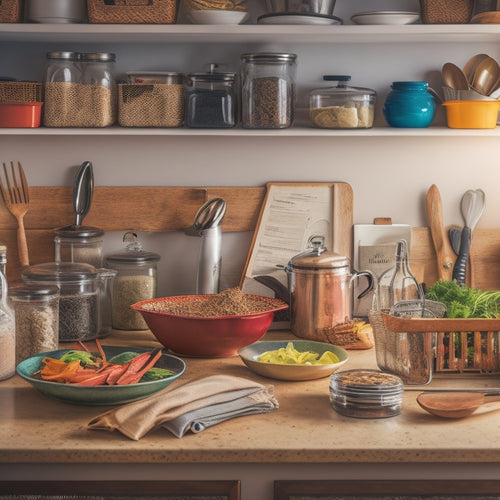
Unlock the Power of Freezing Foods
Share
Freezing foods is a powerful strategy for reducing waste, preserving nutrients, and streamlining meal prep. By employing effective freezing techniques, individuals can extend shelf life, maintain nutritional value, and enhance convenience. Airtight containers, proper storage temperatures, and organized inventory management are essential for maximizing freezer potential. Additionally, frozen foods offer reduced food waste, cost-effectiveness, and guilt-free additions to a healthy meal prep routine. By unleashing the full potential of freezing foods, individuals can optimize their kitchen workflow and discover new possibilities for meal planning and preparation. Next, explore the keys to mastering freezer organization and more.
Key Takeaways
• Freezing food reduces waste, preserves nutrients, and extends shelf life, making it a convenient and healthy meal prep solution.
• Proper freezing techniques, such as airtight containers and labeling, prevent freezer burn and maintain quality.
• Frozen foods offer cost-effective meal prep flexibility, with comparable nutritional value to fresh produce.
• Effective freezer organization, including categorizing and labeling, streamlines meal prep and reduces waste.
• Mastering freezer hacks, like the 'first in, first out' rule, helps unlock the full potential of frozen foods for a healthy and efficient lifestyle.
Buying Smarter, Not Harder
By incorporating frozen foods into their shopping routine, consumers can reduce food waste and support a more sustainable food system. An estimated 30-40% of the food supply is lost or wasted along the supply chain. This approach to smart shopping not only benefits the environment but also enables meal prep flexibility.
Frozen foods can be easily stored and retrieved as needed, making them an ideal option for busy individuals. Planning meals around frozen ingredients can help consumers avoid last-minute takeout or food delivery, reducing waste and saving money. Additionally, frozen foods can be just as nutritious as fresh produce, making them a guilt-free addition to a healthy meal prep routine.
Freezing Like a Pro
To maximize freezer efficiency and preserve food quality, it is essential to understand the nuances of freezing, storing, and consuming frozen foods. Mastering the art of freezing requires more than just tossing food into the freezer. By incorporating quick tips and expert techniques, you can unleash the full potential of your freezer.
For instance, using airtight containers and labeling frozen items can help prevent freezer burn and ensure peak food quality. Additionally, knowing the ideal freezing temperatures and storage times for specific food groups can make all the difference.
The Frozen Food Advantage
Frozen foods offer a trifecta of benefits, including reduced food waste, comparable nutritional value to fresh produce, and extended shelf life, making them an attractive option for health-conscious consumers and environmentally aware individuals alike.
| Benefits | Description |
|---|---|
| Reducing Waste | Frozen foods help reduce food waste along the supply chain, and freezing leftovers or uncooked ingredients prevents waste at home. |
| Nutritional Benefits | Frozen fruits and vegetables have similar nutrient profiles to fresh produce, and frozen meats and fish can be as good as, or better than, fresh options. |
| Convenience | Freezing food extends its shelf life, making it convenient for busy days and meal planning. |
| Cost-Effective | Frozen food is often cost-effective, reducing food spoilage and saving money. |
Mastering Your Freezer
Optimizing freezer storage and management is key to maximizing the full potential of frozen foods. This enables consumers to reap the benefits of reduced food waste, comparable nutritional value, and extended shelf life.
To master your freezer, implement effective organizing tips such as categorizing and labeling containers, storing items by expiration date, and utilizing vertical space.
Leverage freezer hacks like the 'first in, first out' rule, where older items are placed at the front of the freezer, and designating a specific area for frequently used items.
By streamlining your freezer's organization, you can efficiently locate and utilize frozen foods, reducing food waste and saving time.
Preserving Quality and Value
Proper storage and handling techniques play an essential role in maintaining the quality and nutritional value of frozen foods, thereby ensuring consumers reap the benefits of this convenient and sustainable option. By following best practices, frozen foods can retain their flavor and nutritional profile, making them an attractive alternative to fresh produce.
Maximizing nutrients and flavor retention requires attention to detail, including rapid freezing, airtight containers, and consistent freezer temperatures. Additionally, organizing frozen foods in portions and regularly surveying inventory help maintain quality and prevent waste.
Frequently Asked Questions
Can I Freeze Food in Glass Containers or Only Plastic?
When freezing food, selecting the appropriate container is crucial. While glass containers can be utilized, they may be more susceptible to breakage than plastic. Choose BPA-free, airtight plastic containers or glass containers specifically tailored for freezing to guarantee secure food storage.
How Do I Prevent Freezer Burn When Freezing Meat?
To prevent freezer burn when freezing meat, employ proper freezing techniques, such as flash freezing, vacuum-sealing, and airtight containers, ensuring minimal exposure to oxygen and moisture, thereby preserving meat quality and maintaining best meat preservation.
Can I Freeze Cooked Meals, or Only Raw Ingredients?
When freezing cooked meals, consider storing leftovers in airtight containers to prevent freezer burn, and freezing casseroles in individual portions to guarantee even reheating, thereby maintaining texture and flavor.
Is It Safe to Eat Frozen Food Past Its Expiration Date?
Beyond the expiration date, frozen food's safety and quality hang in the balance, as improper freezing techniques and storage can lead to compromised nutritional value and even foodborne illness, necessitating careful consideration of storage tips and quality control.
Can I Freeze Food Directly From the Store, or Must I Cook It First?
When freezing food directly from the store, it is crucial to take into account the type of product: freezing fresh produce and dairy products is generally acceptable, but meats and prepared items may require cooking or specific handling to maintain food safety.
Related Posts
-

Simplify Meal Planning With These 5 Essential Apps
You're tired of last-minute takeout and wasted groceries, and you're not alone. Simplify meal planning with these 5 e...
-

7 Essential Tools to Tame Your Kitchen Chaos
You're one step away from transforming your kitchen into a haven of efficiency and calm. Start by decluttering your c...

